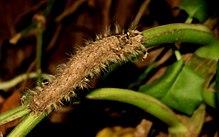| Metanastria hyrtaca | |
|---|---|

| |
| Caterpillar in Sri Lanka | |
| Scientific classification | |
| Kingdom: | Animalia |
| Phylum: | Arthropoda |
| Class: | Insecta |
| Order: | Lepidoptera |
| Family: | Lasiocampidae |
| Genus: | Metanastria |
| Species: | M. hyrtaca |
| Binomial name | |
| Metanastria hyrtaca Cramer, 1782 | |
| Synonyms | |
| |
Metanastria hyrtaca, called the hairy caterpillar as a larva, is a moth of the family Lasiocampidae first described by Pieter Cramer in 1782. It is found in Sri Lanka.
Biology
The adult has a grayish head and thorax and a whitish abdomen. Forewings are brownish with a characteristic reddish-brown spot ringed with white. Hindwings are whitish. Larva yellowish brown with black spots and long lateral tufts of hairs. A reddish band is found in the neck region.
The caterpillar is a serious pest of many economically important crops such as cashew, badam, moringa, sapota, jamun, guava, Vachellia nilotica, Shorea robusta, Schima wallichii, Nyctanthes arbor-tristis, Mimusops elengi and Madhuca longifolia.
References
- "Species Details: Metanastria hyrtaca Cramer, 1782". Catalogue of Life. Retrieved 2 March 2018.
- Koçak, Ahmet Ömer; Kemal, Muhabbet (20 February 2012). "Preliminary list of the Lepidoptera of Sri Lanka". Cesa News (79). Centre for Entomological Studies Ankara: 1–57 – via Academia.
- "Crop Protection: Pests of Sapota". TNAU. Retrieved 2 March 2018.
- "Metanastria hyrtaca (Cramer)". ICAR-National Bureau of Agricultural Insect Resources. Retrieved 2 March 2018.
| Taxon identifiers | |
|---|---|
| Metanastria hyrtaca | |
This article on a moth of the family Lasiocampidae is a stub. You can help Misplaced Pages by expanding it. |